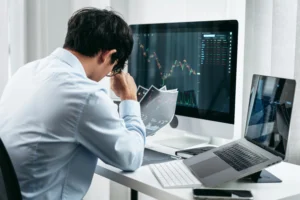Psychological resistance in forex trading leads to losses more often than faulty indicators or bad market timing. While many traders blame their strategy or market volatility, the real reason for underperformance often lies in the mind. Human emotion drives decisions in high-pressure situations, especially in financial markets. Fear, greed, doubt, and revenge all creep in silently, sabotaging even well-planned trades.
This is the hidden layer of forex trading psychology that most beginners ignore and even advanced traders underestimate. A great setup on the chart is meaningless if you hesitate to enter, panic and exit too early, or overtrade after a loss. All of this stems from internal resistance that comes from emotional bias in trading.
The role of psychological resistance in forex trading becomes more evident with experience. Traders begin to notice that their biggest losses weren’t because the market misbehaved—but because they did. Understanding how trading emotions and decision-making interact is essential to fixing the real leak in your trading results. Overcoming fear in forex trading is not just a skill—it’s a necessity.
The Real Face of Psychological Resistance in Forex Trading
What is psychological resistance in forex trading? It’s not just a fear of losing. It is a collection of invisible internal blocks that affect your willingness to follow through with your plan. These resistances come in many forms. Some are based on memory. Others are linked to self-image. Many are unconscious.
Here are some common forms:
- Fear of repeating a past loss
- Fear of missing out
- Overconfidence after a winning streak
- Emotional attachment to specific trades or currency pairs
- Desire to be right rather than make money
These mental blocks prevent rational behaviour. You may recognise a perfect setup but freeze. Or you may rush into a poor setup driven by excitement. This is how emotional bias in trading corrupts good systems.
It’s important to understand that these reactions are not flaws. They are natural. Humans are not wired to handle uncertainty calmly. Trading magnifies these weaknesses because money, identity, and performance are all on the line. Without learning to manage this, psychological resistance in forex trading will quietly damage your consistency.
Trading emotions and decision-making are inseparable. The brain filters market data through a lens of past experience and current emotional state. A news headline might trigger panic. A missed opportunity can turn into reckless entry. Overcoming fear in forex trading means recognising this filter and learning how to see through it.
The Slow Build-Up of Fear and How It Derails Execution
Fear doesn’t always show up as panic. Often, it arrives as doubt. You look at a trade setup and begin questioning your plan. What if the breakout fails? What if the news ruins the momentum? What if the last loss happens again? These thoughts delay entry. When you finally feel confident, the trade has already moved—or worse, reversed.
This fear-driven hesitation is the most common way psychological resistance in forex trading causes missed profits. Many traders take days or weeks to realise how often they skip good trades due to fear. They assume they are playing safe, but they are actually staying stuck.
Even after entering a trade, fear remains. A small pullback feels threatening. The market moving sideways triggers doubt. Many traders exit early, taking small profits or unnecessary losses even though the original setup remains valid.
This repeated cycle builds frustration and weakens discipline. Soon, you stop trusting your own system. Emotional bias in trading makes you think your strategy is flawed when, in reality, it is your reaction to uncertainty that needs fixing.
Forex trading psychology teaches us that we must not eliminate fear but understand it. Fear is a signal, not a command. It reminds us of risk, but it should not dictate our actions. Traders who succeed train themselves to act in line with logic, not emotion. They build routines that remove guesswork and reduce hesitation.
Overcoming fear in forex trading requires more than mindset quotes. It demands deliberate effort, exposure to risk in controlled ways, and reflection on past emotional reactions. Like any skill, it gets better with practice, not theory.
Emotional Bias: When Trading Becomes Personal, Not Professional
One of the most damaging elements of psychological resistance in forex trading is emotional bias. This is when traders unconsciously let personal feelings interfere with objective decisions. It affects how you analyse the market, interpret signals, and execute trades.
Common emotional biases include:
- Confirmation bias: seeing only what supports your existing opinion
- Loss aversion: holding onto losing trades to avoid admitting failure
- Outcome bias: judging a good decision based on the result rather than the process
- Recency bias: giving too much importance to the most recent trade or news
These biases are not obvious at first. But they deeply affect trading performance. A trader may hold onto a trade because they want to be right instead of admitting the setup is no longer valid. Others may avoid a currency pair that recently caused a loss, even if the new setup is excellent.
This kind of emotional bias in trading is dangerous because it feels logical. But in truth, it distorts risk assessment and leads to poor decisions. Trading emotions and decision-making are linked through these invisible filters. Unless you actively challenge them, they will continue to influence your behaviour.
Forex trading psychology teaches that the goal is not to be emotionless but to be emotionally aware. Self-awareness is the first step to change. Once you recognise your biases, you can start to separate fact from feeling.
Overcoming fear in forex trading often means challenging the voice in your head that says, “This will go wrong like last time.” Ask instead, “What does the data say?” The difference between those two questions defines a professional trader.
Revenge Trading and the Trap of Emotional Overload
When traders take a big loss, it triggers a wave of frustration, anger, and self-doubt. This creates a dangerous situation. Many fall into revenge trading—the act of entering trades emotionally to make back what was lost. These trades are impulsive, poorly planned, and highly risky.
Psychological resistance in forex trading shows up here as an internal demand to fix the mistake immediately. The trader does not pause. They do not reassess. They act from emotion. In doing so, they increase risk and worsen the situation.
The same emotional overload can occur after a winning streak. Traders feel invincible. They increase lot sizes, trade aggressively, and ignore their rules. Success turns into recklessness. Emotional bias in trading does not just hurt you when you lose—it also misguides you when you win.
Forex trading psychology emphasises the need to detach emotionally from outcomes. This doesn’t mean you stop caring. It means you measure success by execution, not profit or loss. Traders who stay focused on process avoid the traps of overconfidence and revenge.
To prevent revenge trading, you can:
- Take a mandatory break after a major win or loss
- Journal what you felt and what you did
- Use risk limits that force you to stop if rules are broken
- Focus on quality setups, not frequency
Overcoming fear in forex trading also includes managing the fear of missing out. Losing one trade doesn’t mean you’re obligated to win the next. Mistakes happen, but that doesn’t mean you must correct them immediately. A failed trade doesn’t guarantee that the next will follow the same path.
Building Emotional Resilience Through Structured Habits
Emotional resilience in trading is not built during success but during setbacks. The real test of discipline is how you behave after a losing streak, a missed opportunity, or a rough news event. Those who recover faster and respond calmly have an edge greater than any tool or indicator.
Psychological resistance in forex trading weakens when you create a structured trading environment. This includes:
- A written trading plan with exact entry and exit rules
- A risk management model that never changes based on emotions
- A daily routine for pre-market prep and post-market review
- Regular breaks to reset and avoid emotional build-up
These habits reduce emotional volatility. They create a rhythm where trading becomes about repetition and refinement, not reaction. Traders who build structure around their mindset begin to rely on habits instead of hope.
Trading emotions and decision-making improve drastically when you follow routines. You are less likely to panic or overthink. You begin to trust your preparation. Confidence grows from consistent action, not from random wins.
Overcoming fear in forex trading becomes easier when decisions are automated through rules. You don’t need to guess if a trade fits your plan—you know it does. That clarity removes mental noise.
Journaling is especially powerful. Writing down not just what trade you took, but why you took it, how you felt, and what you were thinking adds clarity over time. It shows patterns that no chart can reveal.
Conclusion: Mental Discipline Is the Real Edge
Psychological resistance in forex trading leads to losses because it attacks the one thing every trader needs—clarity. Whether it’s fear of failure, an urge for revenge, or emotional bias from past trades, these forces push you off your plan.
Forex trading is not just about analysis or timing. It is about making consistent decisions under pressure. That requires mental strength, emotional awareness, and daily discipline. Emotional bias in trading will always exist, but it doesn’t have to control you.
By understanding the connection between trading emotions and decision-making, you can begin to reclaim your control. You can create habits that reduce resistance and systems that support logic over emotion. Overcoming fear in forex trading does not mean you eliminate it—it means you outgrow it.
Remember this: the market will always test your mindset before it tests your method. And the traders who win long term are the ones who train both.
Read here to learn more about “Order Flow Trading vs. Technical Analysis for Modern Traders“.

I’m Chaitali Sethi, a financial writer and market strategist focused on Forex trading, market behaviour, and trader psychology. I simplify complex market movements into clear, practical insights that help traders make better decisions and build a stronger trading mindset.

